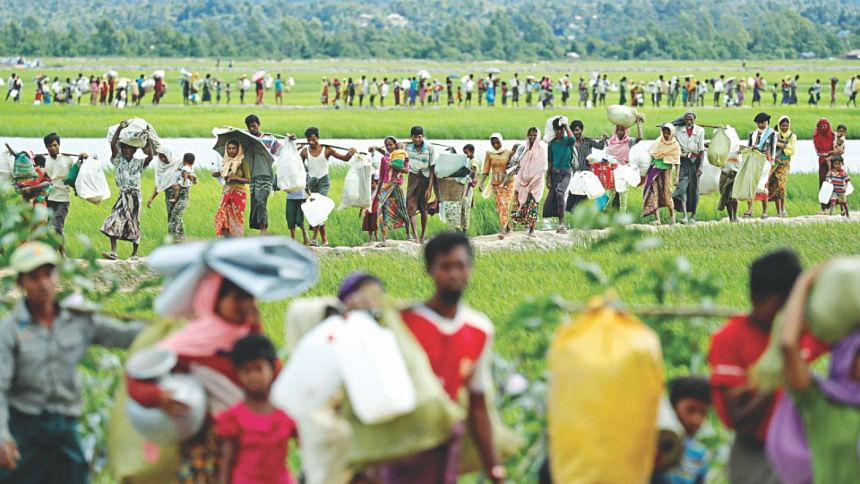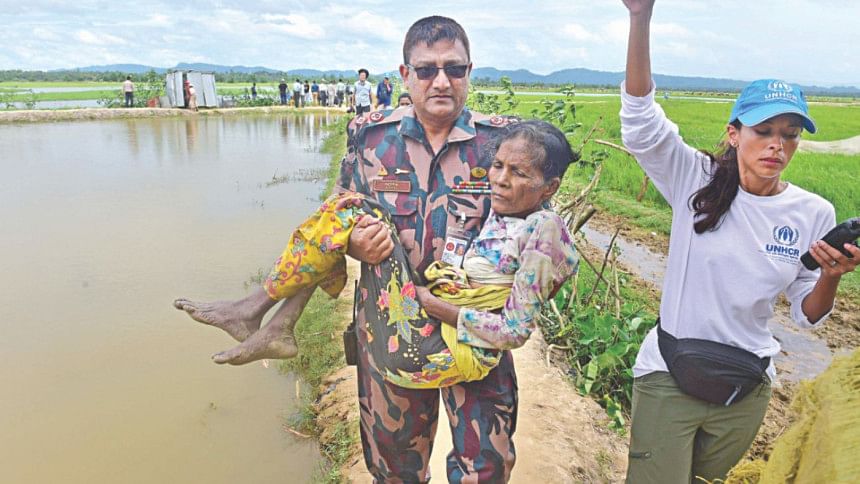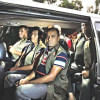Shift Rohingyas from tourist town

Representatives from Cox's Bazar 's Civil Society and non-government organisations yesterday formed a forum demanding the shifting of Rohingyas from the tourist town, protecting local environment and upholding human rights of the Rohingyas.
The call was made at a press conference held at Cox's Bazar press club. The forum further demanded the formation of a cell by the government to conduct research of the possible threats on the livelihood of local people by the large influx of Rohingyas from Myanmar.
It further demanded the restoration of the ecological and economical balance of the area. They suggested that the cell conduct research on short and long term losses on the natural resources, economy, health and tourism of Cox's Bazar.
Chief Executive of Coast Trust Rezaul Karim, Cox's Bazar Civil Society president Abu Morshed Chowdhury Khoka and IPSA chief executive Arifur Rahman spoke at the press conference.
In these regards, a written statement titled "Localisation of Rohingya Relief activities and accountability" was presented.
The demands of the forum also included that long term plans be formed before the announcement of next budget. They said the UN is committed to localising both national and international NGOs and ensuring their accountability and transparency.
They said the management of the refugee crisis be completely separated from the district administration. They also stressed the urgent need for setting up of an administrative structure led by a secretary level official for Rohingya management.
Instead of dependence on others, the government should establish its full control over the refugee management, the statement read. In terms of child care and rehabilitation, the UN Child Rights Convention should be followed, they said.
The Forum said a serious threat has been created for the local population at Ukhia and Teknaf areas, although it added that the Bangladesh government giving shelter to the Rohingyas was a praiseworthy step.
But for the sake of the tourist zone in Cox's Bazar, Rohingyas needed to be shifted elsewhere, while upholding the human rights of the Rohingyas.

SHISHU PALLI
BSS reports that the government has taken an initiative to build 'Shishu Palli', a kind of residence, for protecting the orphan Rohingya children.
"The government has a plan to construct Shishu Palli in next month...after identifying the orphan Rohingya children," said Syeda Ferdous Akhter, additional director of the Department of Social Services (DSS).
In the last 30 days since September 20, the government has identified 18,449 Rohingya orphan child and the project is being implemented through the Myanmar National Orphan Child Programme, Akhter, also a coordinator of the programme, said.
The DSS official, however, said that the construction work of the Shishu Palli might be delayed as the Rohighyas are still coming from Myanmar.
The social service department is engaged in registering orphan child from the Rohinghya camps who have been classified into four categories---those who lost both parents, who lost only the father, physically disabled children and children with missing parents.
The government is enrolling orphan children up to 18 years for the initiative.
The enrollment has already been completed in five Rohingya camps in Tekhnaf, said the DSS official, adding that they are now working on the two big camps-Kutupalang and Balukhali.
Identified orphans will get smart cards from the social services department, Pritam Kumar Chowdhury, Deputy Director of Cox's Bazar Office of DSS, said.
The estimated number of orphan Rohingya children might be up to 25,000, said the official.
The project has been initiated after a directive given by Prime Minister Sheikh Hasina. For this purpose a special 'safe zone' would be built for the Rohingya orphan children.
Scores of Rohingyas have been killed in the ongoing violence in Rakhine state in Myanmar since August 25 and many orphan children have entered Bangladesh to flee the brutality.
Meanwhile, several thousand Rohingyas, who had been waiting for two days near the border point in Anjumanpara of Ukhia, were given shelter at the Balukhali refugee camp yesterday.
They crossed into Bangladesh through the Naf river on Monday.
They were given relief and medical treatment at the camp.
Those taken to the camp included 3,124 children, 2,044 women and 1,064 men. Of them, 871 were elderly people, said Maj Ashikur Rahim, operation officer of BGB 34 Battalion in Cox's Bazar.
He said 15 other Rohingyas were sent to Médecins Sans Frontières's health clinic in Kutupalong.

 For all latest news, follow The Daily Star's Google News channel.
For all latest news, follow The Daily Star's Google News channel. 







Comments